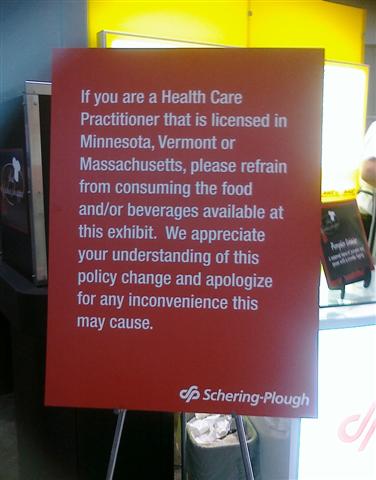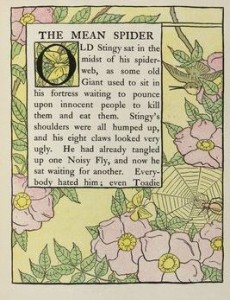So disabled-rights groups are pressuring universities to spurn the popular reading device [Al Tompkins/Poynter]
Posts Tagged ‘publishers’
“Red Hat Club” author loses suit over portrayal
A Hall County, Georgia jury has awarded $100,000 in damages to a woman who said that a character in the best-selling novel “The Red Hat Club” was recognizably based in part on herself, and was falsely portrayed as an “alcoholic slut.’ The lawsuit also named New York-based St. Martin’s Press (which, I should mention, is the publisher of my own book The Rule of Lawyers). [Gainesville Times, OnPoint News, decision in PDF]
More: Fulton County Daily Report (per defense counsel, jurors “were essentially instructed that, in Georgia, modeling a fictional character after a real person is a strict liability offense.”)
Book pricing antitrust petition
“The American Booksellers Association loves people who buy books. It loves them so much that it wants to protect them from wicked retailers who sell popular titles at affordable prices.” [Jeff Jacoby, Boston Globe] More: Mark Perry.
Related: antitrust laws mostly “used today by one group of competitors to try to hamstring another competitor in their business” [Coyote on IBM mainframe investigation]
New California anti-paparazzi law
Some predict the new $50,000 fine for unauthorized clicking — and the law’s provision allowing suits against publications that have knowingly run the photos — will have a chilling effect on news gathering [WSJ Law Blog, PI Newswire]
FTC vs. bloggers, cont’d
Excitable bloggers like us ought to calm down, because it’s not as if official crackdowns on the dispensing of freebies ever generate absurd results:  Docblogger White Coat just snapped that picture at the scientific assembly of the American College of Emergency Physicians. (The campaign against drug company freebies for doctors, of course, began with publicity over inducements that were a whole lot more sizable and focused than convention-hall refreshments, but appears to have quickly extended to de minimis courtesies as well).
Docblogger White Coat just snapped that picture at the scientific assembly of the American College of Emergency Physicians. (The campaign against drug company freebies for doctors, of course, began with publicity over inducements that were a whole lot more sizable and focused than convention-hall refreshments, but appears to have quickly extended to de minimis courtesies as well).
Meanwhile, FTC officials are getting all huffy about supposed misunderstandings and misconceptions about their new guidelines. Per PRNewser, some blogs have mistakenly reported the applicable fines as ranging up to $11,000, which is an obsolete number and should in fact be $16,000. Besides which, the commission does not have the authority to impose such fines on its own authority — it has to take its target to court. (Feeling reassured yet?) And FTC assistant director Richard Cleland says the agency does not intend to go after bloggers for nondisclosure standing alone (as opposed, apparently, to nondisclosure in combination with claimed misrepresentation of the qualities of the books, movies, conferences or whatever is being promoted). The main targets of regulation, he stresses, are the publishers or others who dispense the freebies — who of course will have new incentives to protect themselves by controls on distribution, as did Schering-Plough in the sign above.
Something to look forward to, no doubt, in the exhibit hall at future conventions: “If you are a blogger or other Social Media user, please refrain from taking any of the free magazines, calendars or sun visors in this display…” (& welcome Glenn Reynolds/Instapundit readers)
P.S. Coyote:
Anyone who has been involved in NCAA recruiting can tell you the absurd results that flow from defining even tiny freebies as violations. For example, when I interview high school students for Princeton, I have to be careful not to buy them lunch or coffee on the off-chance they turn out to be athletes where such a purchase could trigger a recruiting violation.
And Patrick at Popehat identifies another sort of “endorsement” that might arguably be covered by the language of the guidelines: linking to other blogs, especially when done insincerely.
MTA vs. freelance publishers
T-shirts tweaking San Francisco transit? “Like so many things, it’s all fun and games, until you get sued” — in this case, a threat of suit from New York’s Metropolitan Transit Authority. [SF Weekly] And the MTA has dropped its claims against Greenwich, Ct. blogger Chris Schoenfeld (“Station Stops“), who puts out an iPhone app providing train schedule information [Greenwich Time]
CPSIA: “The Waiting Game Continues for Libraries”
Karen Raugust, Publisher’s Weekly, on some recent clarification (not exactly relief) for makers and sellers of new books under the Draconian law:
The Consumer Products Safety Commission recently issued a final lead rule that deemed many—but not all—of the components in ordinary children’s books safe. …
Most ink-on-paper and ink-on-board books will not have to undergo testing under various CPSC rulings. (Some so-called “ordinary” books, such as those with gold foil or spiral bindings, must be tested, and big retailers may require testing even when the CPSIA doesn’t.) All novelty and book-plus formats for children 12 and under must be tested by independent labs.
 However, the CPSC has yet to issue promised guidance to libraries on pre-1985 books:
However, the CPSC has yet to issue promised guidance to libraries on pre-1985 books:
Thom Barthelmess, president of the Association for Library Service to Children, a division of the American Library Association, says most librarians are waiting to see what happens. “We’re hoping for a happy resolution, so our collections aren’t decimated,” he says. If the CPSC’s ruling results in libraries needing to pull books from shelves, “there would be huge ramifications,” he continues. “If we lose a lot of titles printed before 1986, many of which are irreplaceable, it would have a huge impact on the nature of our collections.”
We’ve linked the coverage in Publisher’s Weekly several times over the course of the year but overlooked this report from March:
Most booksellers are now comfortable selling ordinary paper children’s books printed in 1986 and beyond. …
Half Price [Half Price Books, a large chain] removed all book-plus items from the shelves in every store and is warehousing them while it researches how to dispose of them in a safe and environmentally sound way, perhaps at a hazardous waste site.
And an official of the Independent Online Booksellers Association told PW in March that most members of the association were positioning their vintage children’s books as adult collectibles, which supposedly reduces legal risk, though as we noted in February, “the law provides that [retailers] are liable if they sell a product which will commonly be understood as destined for use by children, whether or not they label it as such.” Deputy Headmistress in February and Valerie Jacobsen in March also explained more about the practical drawbacks of the “relabel as collectibles” dodge, as has Elizabeth Mullaney Nicol more recently.
P.S. And welcome listeners at Hartford’s WTIC, where host Ray Dunaway had me as a guest on his show this morning to discuss the law. You’ll find much more here.
PUBLIC DOMAIN GRAPHIC: Edith Brown, illustrator, Jeannette Marks, The Cheerful Cricket and Others (1907), courtesy The Children’s Library.
Wall Street “Bull” sculpture
The sculptor of the artwork on prominent public display in New York’s financial district sues a book publisher and authors who used a photo of it on their cover [John Carney, Business Insider]
Guinness Book of Records mocked, responds with nastygram
And now millions more people are going to learn about the funny screwup on the Book’s website. [TechDirt, FAILblog via Citizen Media Law]
Former employee says she wasn’t paid
Rosalie Farnsworth made various charges against the publisher of a defunct South Florida magazine; now he says he’s suing her for defamation. [Broward Palm Beach New Times, its earlier report]
